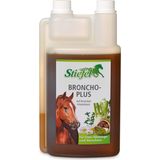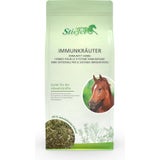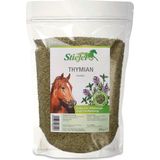The Respiratory Tract
What are the airways?
Everyone always talks about it, but what do they really mean by it? The airways are the organs that transport inhaled air to the lungs.
These include the upper respiratory tract (nasal cavities, pharynx) and lower respiratory tract (trachea and bronchi). The lower airways open into the alveoli (small alveoli), where the actual gas exchange takes place. This means that the oxygen from the air is released into the blood and transported to the organs. Carbon dioxide, in turn, is pumped out of the lungs via the airways. Strictly speaking, the lungs themselves are not respiratory tracts but are often included in the discussion of respiratory problems.
The airways channel the air into the body, distribute it in the lungs and then release it out of the lungs. The mucus-like coating of the respiratory tract moistens the passing air, and impurities such as hay dust or pathogens attach to it instead of being transported to the lungs. Healthy respiratory tracts can purify themselves by transporting the contaminated mucus out of the airways, for example by exhaling. The function of the respiratory mucous membranes is thus part of the body's own defenses and belongs to the immune system.
Heavy work for the immune system at the end of the year
Unfortunately, and especially at the end of the year, respiratory disorders often occur and can also affect the lungs. In Autumn, horses experience a change of coat. At that time, the body is already running at full speed however the horses consume many proteins, vitamins, trace elements (eg copper, selenium and zinc) and minerals. As a result, more energy is needed for this conversion and the metabolism is heavily stressed. The extra need for amino acids and essential fatty acids increases during this period.
In addition to the external influences such as rain, wind and cold, the risk of infections of the respiratory tract increases due to this extra workload.
FREE AIRWAYS - Prophylaxis and support
If the horse coughs, the respiratory tract may be irritated or infected. There are numerous causes for this. For example, bacteria or viruses can attack the mucous membranes. In addition, external factors such as dusty litter can increase the severity of coughing. With targeted feeding of special herbs and herbal juices, you can not only remedy the situation in acute cases but also have a preventive positive effect on the respiratory tract and mucous membranes and strengthen the bronchial system. Of course, one should always treat the cause of coughing instead of only the symptoms. If the horse is weak and listless, it is recommended to check for a fever and consult the veterinarian.
Stiefel Cough Herbs - For free airways and bronchia
Stiefel cough herbs are a selected herbal mixture including anise, stinging nettle, echinacea, sage, ribwort, thyme and many other herbs. The mixture has a soothing, calming and expectorant effect, which can have a positive effect on the respiratory system and the bronchial system. The proven Stiefel cough herbs have been helping horses through the cold season for nearly 30 years and help support the respiratory and bronchial systems.
Stiefel's tried-and-tested blend can also be used for chronic ailments and is also suitable for prolonged administration. The mixture is administered dry or slightly moistened with the feed. To develop an even more intensive effect of the herbs, you can also pour hot water over them and then mix the herbal mix into the food.
Stiefel Immune Herbs - For a strong immune system
The Stiefel immune herbs contain a mix of different herbs - expertly chosen to stimulate and strengthen the immune system. The mix includes rosehip, echinacea, licorice, taiga root, peppermint and goldenrod. The herbs contained in it are known to support the immune system. Rosehip, for example, contains a lot of vitamin C, licorice is said to have an antibiotic effect and Echinacea is said to shorten infection times. Stiefel immune herbs can be fed as a preventative measure but also to tackle acute illnesses so that the immune system can cope faster with the pathogens in the body.
The effect is particularly intense if you feed the herbs as a tea. The herbs are simply doused with warm water. After they have cooled down a bit, you can simply mix the herbs and the brew under the feed.
Stiefel Broncho Plus - For free airways and bronchia
For acute cases, Stiefel offers the proven product Broncho Plus - a bronchial tonic with liquid herbal extracts in a practical dosing bottle. An extra portion of Thyme, Chestnut, Chamomile, Fennel and Star Anise support respiratory regeneration. Star anise brings a sweet, licorice-like flavour that many horses like. With very picky horses one can also administer the liquid orally.
THE SECRET TIP FOR STRONG LUNGS: Black cumin
Black cumin is a spice which has been used as a remedy for thousands of years. There are several studies on how black cumin positively affects the immune system. It can aid the body in the formation of important bone marrow cells and promote interferon production. Interferon protects normal cells from the harmful effects of viral diseases as well as destroying pathological cells. It also increases the number of B cells that produce antibodies. In addition, black cumin seeds and black cumin oil contain valuable omega-3 fatty acids, which are known to have anti-inflammatory effects.
Black cumin is used particularly successfully in feeding horses with respiratory diseases. Black cumin is said to be able to expand the volume of the alveoli and thus facilitate breathing and coughing.
Related products
-
 4.7 (17)
4.7 (17)Stiefel Broncho Plus, 1 l
Bestseller- Liquid bronchial elixir
- For clear airways and bronchial tubes
- Based on bronchial herbs
£21.49 (£21.49 / l)Delivery by May 08
-
 5.0 (6)
5.0 (6)Stiefel Immunity Herbs , 1 kg
New!- 100% natural herbal mixture
- Immunity herbs
- Good for the body's defences
£21.84 (£21.84 / kg)Delivery by May 08
-
 5.0 (5)
5.0 (5)Stiefel Thyme, Chopped, 500 g
- Good for the respiratory tract and digestion
- Chopped thyme
- Single component feed for horses
£8.68 (£17.36 / kg)Delivery by May 08
-
Great Britain: Free standard delivery from £79.90
-
Free
returns Secure payments
with SSL encryption technology

